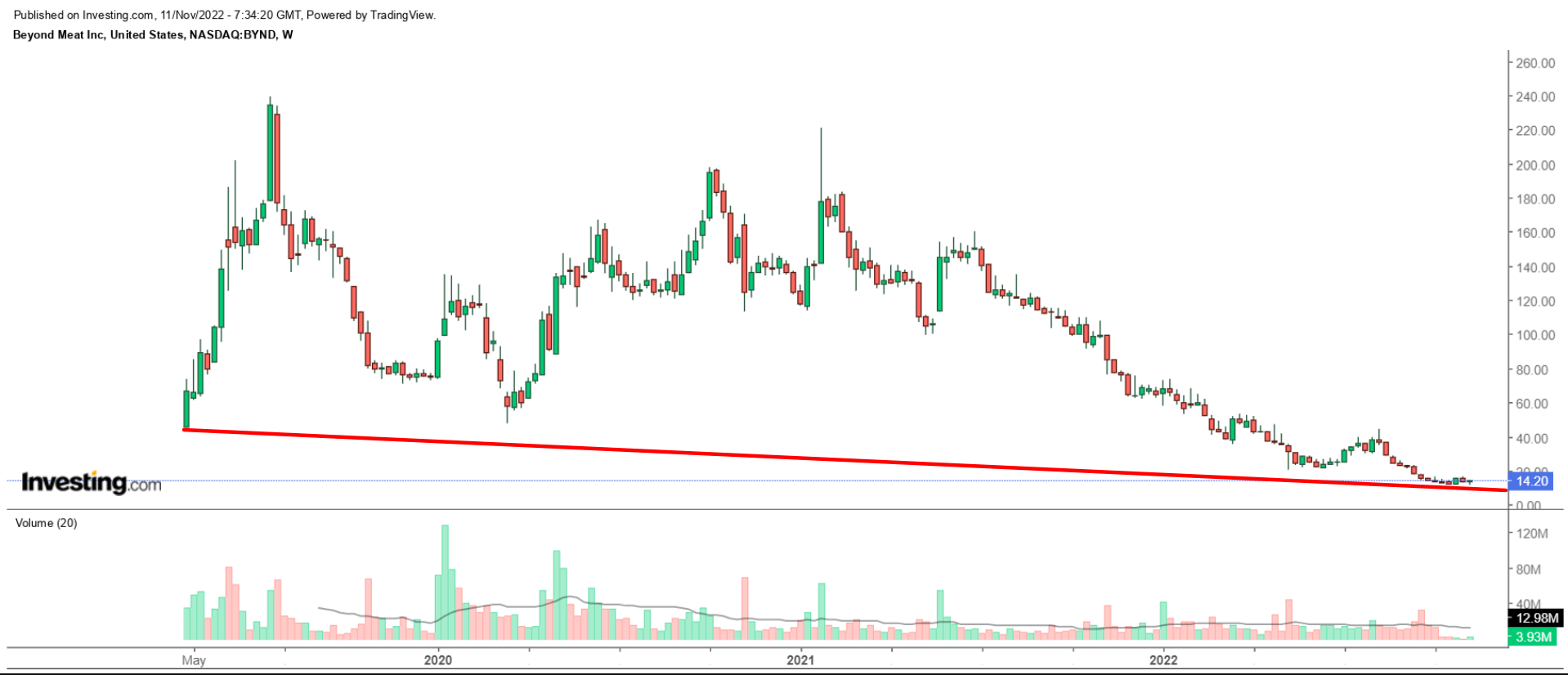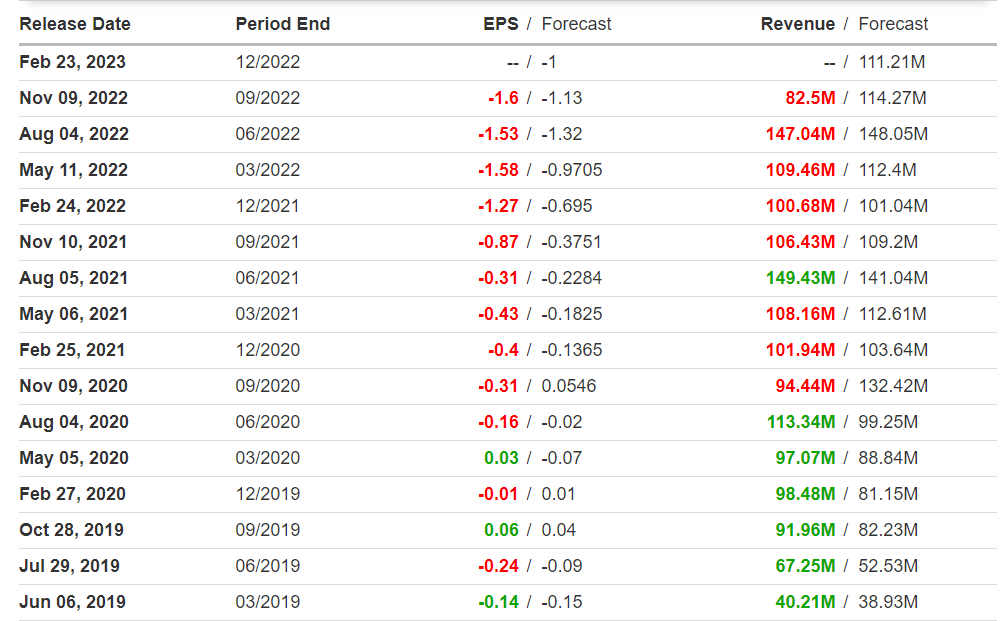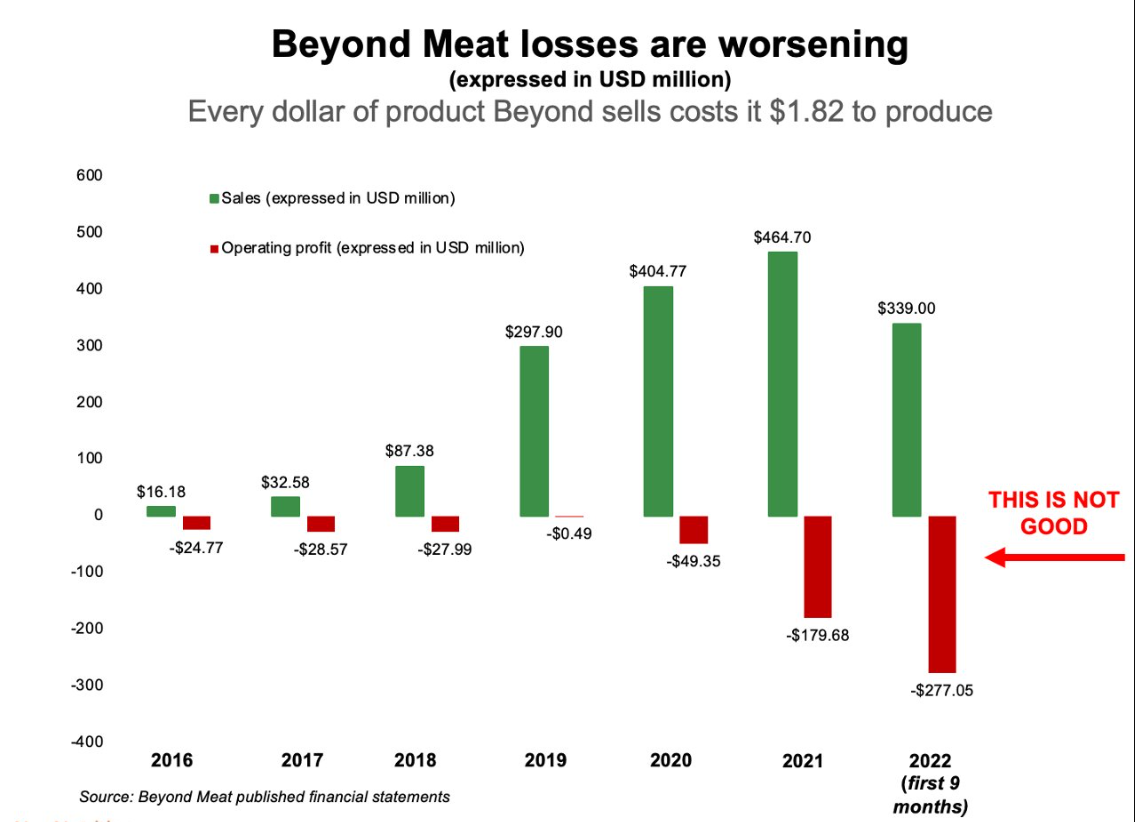- Out-of-favor Beyond Meat has struggled in 2022
- Stock is down 78.2% year-to-date
- Remain bearish and continue to believe there are material risks to its outlook
Beyond Meat (NASDAQ:BYND) has seen its valuation collapse to new lows in 2022 as the former market darling suffers from a brutal combination of weakening demand for plant-based meat substitutes and increasing competition from companies such as Tyson Foods (NYSE:TSN) and privately owned Impossible Foods.
In addition to deteriorating fundamentals, the beleaguered plant-based meat company has also struggled amid a difficult macroeconomic backdrop of rising interest rates, elevated inflation, and worries about a possible recession.
After rallying to a record high of $239.71 in July 2019, BYND stock—which is down 78.2% year-to-date (ytd)—tumbled rapidly to a low of $11.56 on Nov. 10. The shares have since staged a modest rebound but stand 94.1% below their all-time peak.
At current levels, the El Segundo, California-based company has a market cap of $905.1 million compared to roughly $15 billion at its peak.
I think BYND remains vulnerable to further losses as it faces several challenges.
Losses Are Worsening, Revenue Is Shrinking
Beyond Meat lost a record $101.7M, or $1.60 a share, in Q3, almost doubling its net loss year on year (yoy) and missing consensus estimates due primarily to rising operating expenses and surging freight and raw material costs. It has now missed earnings estimates for 10 straight quarters, dating back to Q1 2020, which also happened to be the last time the company turned a profit.
To make matters worse, Beyond also said it expects a further slowdown in demand for its products. Net revenue sank 22.5% to $82.5M in Q3, much worse than expectations of $114.3M, as cash-strapped consumers avoided the company’s meatless burger, sausage, and chicken alternatives and instead bought cheaper proteins.
Beyond Meat said U.S. grocery sales dropped 11.8% in the quarter, while total pounds sold and net revenue per pound—two key sales metrics—declined 12.8% and 11.2%, respectively. Its weakening sales trends were even more concerning outside the U.S., with international grocery sales collapsing 53% from last year.
“This is a difficult period economically across the country and across the world,” said CEO Ethan Brown, who called the results “disappointing”. Brown added that the volume of competition in the plant-based meat category has eroded some of Beyond Meat's market share.
"All markets and channels were negatively impacted by a combination of weaker than expected demand in the category and certain customer and distributor changes such as reductions in targeted inventory levels, among other factors," Beyond Meat said in its release.
Rising Cash Burn Highlights Balance Sheet Risks
Beyond Meat's balance sheet is a cause for concern, as the company burns capital at a worryingly high rate.
It has failed to generate any positive free cash flow since going public in 2019—ended Q3 with cash and cash equivalents of $390.2M, down from $455M in the preceding quarter. Despite the company's cost-cutting measures, total outstanding debt stood at $1.1B.
All in all, Beyond’s losses from operations in the nine months ended Oct. 1 widened to $277.1M, compared to $97.2M in the prior-year period.
At the current cash-burn rate, it could potentially run out of money in less than 12 months, raising the risk of bankruptcy.
Bottom Line
I expect things will get worse for the alternative protein producer in the months ahead, as demand for its meat substitutes stays soft amid the current environment.
Beyond guided full-year 2022 sales to be between $400M and $425M, down roughly 14% to 9% compared to 2021 and below the consensus of $453.4M.
The company's margins are likely to take an even bigger hit in the months ahead as it attempts to revive demand for its products by offering restaurants and grocery customers steep discounts.
"We are testing a pricing reduction that more quickly collapses the pricing delta between one of our core products and its animal protein equivalent," Brown said.
As such, it doesn’t look like Beyond Meat’s top-line growth will improve significantly anytime soon, which will likely prolong its path to profitability and heighten its execution risk.
I remain pessimistic about the company’s growth prospects, with either an acquisition or outright failure looking like the most likely outcomes.
Disclosure: At the time of writing, Jesse is long on the Dow Jones Industrial Average and the S&P 500 via the SPDR Dow ETF (DIA) and the SPDR S&P 500 ETF (SPY). He is also long on the Energy Select Sector SPDR ETF (XLE) and the Health Care Select Sector SPDR ETF (XLV). The views discussed in this article are solely the opinion of the author and should not be taken as investment advice.
